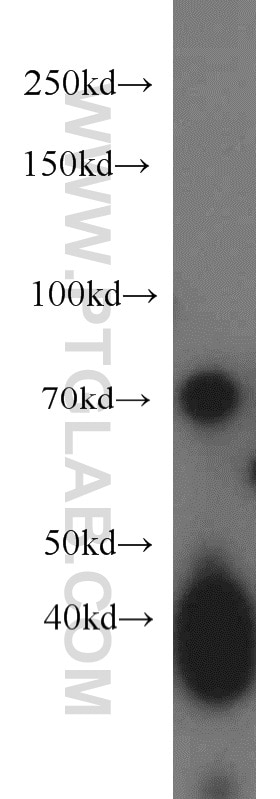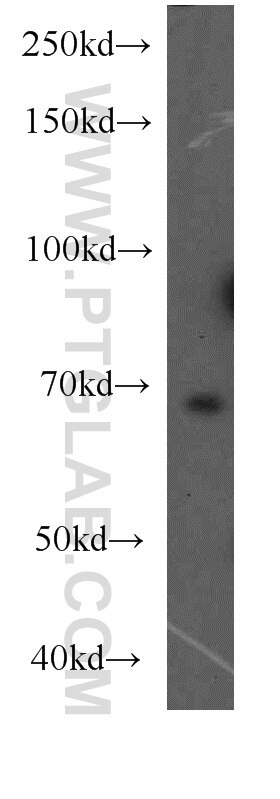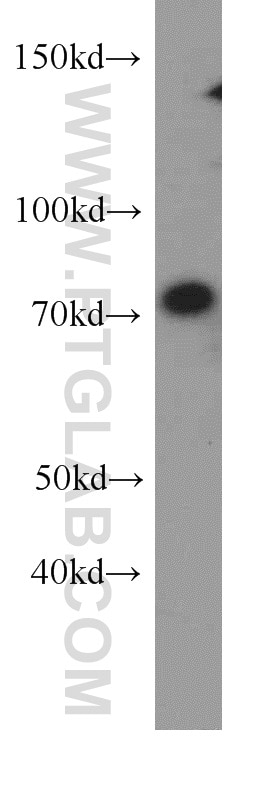Tested Applications
| Positive WB detected in | HepG2 cells, mouse brain tissue, mouse liver tissue |
Recommended dilution
| Application | Dilution |
|---|---|
| Western Blot (WB) | WB : 1:1000-1:4000 |
| It is recommended that this reagent should be titrated in each testing system to obtain optimal results. | |
| Sample-dependent, Check data in validation data gallery. | |
Published Applications
| WB | See 1 publications below |
Product Information
19609-1-AP targets PCDHB5 in WB, ELISA applications and shows reactivity with human, mouse samples.
| Tested Reactivity | human, mouse |
| Cited Reactivity | human |
| Host / Isotype | Rabbit / IgG |
| Class | Polyclonal |
| Type | Antibody |
| Immunogen |
CatNo: Ag7491 Product name: Recombinant human PCDHB5 protein Source: e coli.-derived, PET28a Tag: 6*His Domain: 382-690 aa of BC001186 Sequence: CSIQNDLPFLLKPTLKNFYTLVTQRTLDRESQAEYNITITVTDMGTPRLKTEHNITVLVSDVNDNAPAFTQTSYTLFVRENNSPALHIGSVSATDRDSGTNAQVTYSLLPPQNPHLRLASLVSINADNGHLFALRSLDYEALQAFEFRVGATDRGSPALSSEALVRVLVLDANDNSPFVLYPLQNGSAPCTELVPRAAEPGYLVTKVVAVDGDSGQNAWLSYQLLKATEPGLFSMWAHNGEVRTARLLSERDAAKHRLVVLVKDNGEPPRSATATLHVLLVDGFSQPYLPLPEAAPAQAQADSLTVYLV Predict reactive species |
| Full Name | protocadherin beta 5 |
| Calculated Molecular Weight | 86 kDa |
| Observed Molecular Weight | 86 kDa, 70-75 kDa |
| GenBank Accession Number | BC001186 |
| Gene Symbol | PCDHB5 |
| Gene ID (NCBI) | 26167 |
| RRID | AB_10792248 |
| Conjugate | Unconjugated |
| Form | Liquid |
| Purification Method | Antigen affinity purification |
| UNIPROT ID | Q9Y5E4 |
| Storage Buffer | PBS with 0.02% sodium azide and 50% glycerol, pH 7.3. |
| Storage Conditions | Store at -20°C. Stable for one year after shipment. Aliquoting is unnecessary for -20oC storage. 20ul sizes contain 0.1% BSA. |
Protocols
| Product Specific Protocols | |
|---|---|
| WB protocol for PCDHB5 antibody 19609-1-AP | Download protocol |
| Standard Protocols | |
|---|---|
| Click here to view our Standard Protocols |
Publications
| Species | Application | Title |
|---|---|---|
Theranostics A Compound AC1Q3QWB Selectively Disrupts HOTAIR-Mediated Recruitment of PRC2 and Enhances Cancer Therapy of DZNep. | ||
iScience Using brain cell-type-specific protein interactomes to interpret neurodevelopmental genetic signals in schizophrenia |










